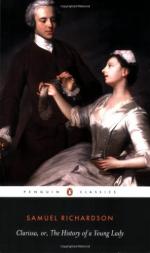I asked, if a letter written by myself, by her doctor or apothecary, to any of her friends, representing her low state of health, and great humility, would be acceptable? or if a journey to any of them would be of service, I would gladly undertake it in person, and strictly conform to her orders, to whomsoever she should direct me to apply.
She earnestly desired that nothing of this sort might be attempted, especially without her knowledge and consent. Miss Howe, she said, had done harm by her kindly-intended zeal; and if there were room to expect favour by mediation, she had ready at hand a kind friend, Mrs. Norton, who for piety and prudence had few equals; and who would let slip no opportunity to endeavour to do her service.
I let her know that I was going out of town till Monday: she wished me pleasure; and said she should be glad to see me on my return.
Adieu!
LETTER LXXIV
Miss Ar. Harlowe, to miss CL. Harlowe [in answer to her’s of July 29. See letter LXII. Of this volume.] Thursday Morn. Aug. 3.
SISTER CLARY,
I wish you would not trouble me with any more of your letters. You had always a knack at writing; and depended upon making every one do what you would when you wrote. But your wit and folly have undone you. And now, as all naughty creatures do, when they can’t help themselves, you come begging and praying, and make others as uneasy as yourself.
When I wrote last to you, I expected that I should not be at rest.
And so you’d creep on, by little and little, till you’ll want to be received again.
But you only hope for forgiveness and a blessing, you say. A blessing for what, sister Clary? Think for what!—However, I read your letter to my father and mother.
I won’t tell you what my father said—one who has the true sense you boast to have of your misdeeds, may guess, without my telling you, what a justly-incensed father would say on such an occasion.
My poor mother—O wretch! what has not your ungrateful folly cost my poor mother!—Had you been less a darling, you would not, perhaps, have been so graceless: But I never in my life saw a cockered favourite come to good.
My heart is full, and I can’t help writing my mind; for your crimes have disgraced us all; and I am afraid and ashamed to go to any public or private assembly or diversion: And why?—I need not say why, when your actions are the subjects either of the open talk, or of the affronting whispers, of both sexes at all such places.
Upon the whole, I am sorry I have no more comfort to send you: but I find nobody willing to forgive you.
I don’t know what time may do for you; and when it is seen that your penitence is not owing more to disappointment than to true conviction: for it is too probable, Miss Clary, that, had not your feather-headed villain abandoned you, we should have heard nothing of these moving supplications; nor of any thing but defiances from him, and a guilt gloried in from you. And this is every one’s opinion, as well as that of




